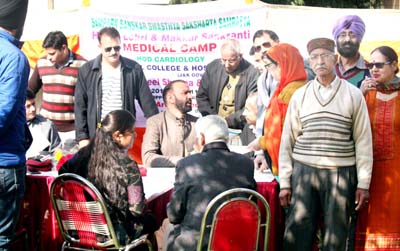Excelsior Correspondent
JAMMU, Jan 14: Stressing on the need to place health at the centre of urban planning and policymaking so that a culture of health is within the reach, Dr. Sushil Sharma, HoD Cardiology, GMC Jammu today held a day long camp in Trikuta Nagar. More than 250 people were screened, evaluated, diagnosed and free medicines were given as per the requirements
During his interaction, Dr Sushil maintained that recent studies are indicative of the fact that most of the top ten causes of death directly or indirectly are influenced by faulty urban design and planning policies. Chronic non-communicable diseases have multiple factors (genetic, epigenetic, behavioural and environmental). In this context, conditions that are more frequent in the urban setting such as air pollution, social stress and climate change should be considered important health determinants and included in the policymaking and planning process to effectively contribute to health promotion at all social levels.
“Green environments are associated with better self-reported health, lower blood pressure, lower psychophysiological stress and lower mortality risks. Today, we face different health challenges, from chronic diseases such as heart disease, cancer and diabetes,” she added.
Addressing these health concerns requires thinking explicitly about how urban planning affects a community’s health. That means examining how the physical features of our community landscapes-sidewalks, roads, transit systems and buildings-serve as health assests. Health-oriented urban planning today would factor in not only the need for public parks, but also the need for walkability so that residents can enjoy walking as part of their everyday lives. The physical environment, which is shaped by planning decisions, can facilitate or deter a healthy lifestyle. The propensity of people to walk, cycle or play in open air is affected by the convenience, quality and safety of pedestrian and cycling routes and by the availability of local open space. Regular exercise protects against heart disease and, by limiting obesity, reduces the onset of diabetes, he added.
In fact, health should be considered a primary delineator of urban development and management, and different stakeholders must engage in the process of adding to Plato’s utopian ideal city based on politics, ethics and social relations, a fourth parameter i.e., human health, Dr Sushil said.
Others who were prominently associated with this initiative included Dr. Dhaneshwar Kapoor, Dr. Kewal Sharma and Dr. Chakshu Mahajan. Paramedics and Volunteers who were part of the team included, Vikas Kumar, Kamal Kishore, Sahil Raina, Amandeep Singh, Rajeev Vohra,Vikas Sabharwal, Gourav Sharma, Rajinder Singh, Bhanu Pratap Singh, Ankush Kohli and Akshay Kumar.
Trending Now
E-Paper


